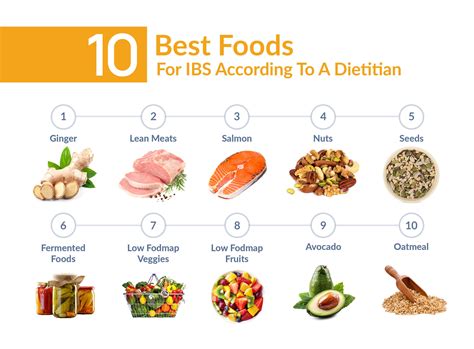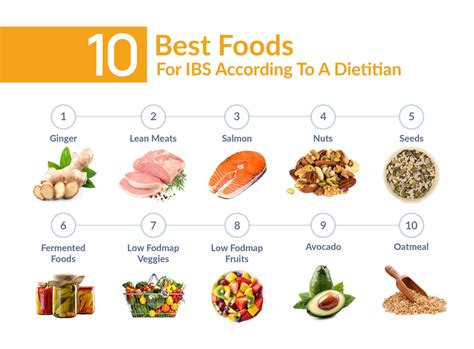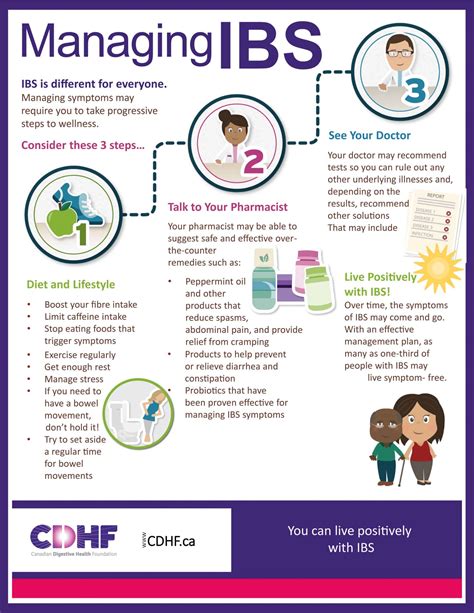Intro
Discover 5 soothing foods for IBS relief, including low-FODMAP options, gut-friendly fiber, and anti-inflammatory ingredients to calm irritable bowel syndrome symptoms and promote digestive health.
Irritable Bowel Syndrome (IBS) is a common disorder that affects the large intestine, causing a variety of symptoms including abdominal pain, bloating, gas, diarrhea, and constipation. While the exact cause of IBS is still unknown, research suggests that diet plays a significant role in managing its symptoms. Certain foods can trigger or worsen IBS symptoms, while others can help alleviate them. In this article, we will explore five foods that can help manage IBS symptoms and provide tips on how to incorporate them into your diet.
The importance of a balanced diet for IBS sufferers cannot be overstated. Eating the right foods can help regulate bowel movements, reduce inflammation, and alleviate symptoms such as bloating and abdominal pain. On the other hand, consuming trigger foods can exacerbate symptoms and make managing IBS more challenging. By understanding which foods are beneficial and which ones to avoid, individuals with IBS can take control of their symptoms and improve their overall quality of life.
Managing IBS requires a comprehensive approach that includes dietary changes, stress management, and lifestyle modifications. While there is no cure for IBS, making informed food choices can help alleviate symptoms and improve digestion. In this article, we will delve into the benefits of five specific foods that can help manage IBS symptoms and provide guidance on how to incorporate them into your diet. Whether you are newly diagnosed with IBS or have been living with the condition for years, this article aims to provide you with valuable insights and practical tips to help you manage your symptoms and improve your overall health.
Introduction to IBS-Friendly Foods

IBS-friendly foods are those that are gentle on the digestive system and can help alleviate symptoms such as bloating, abdominal pain, and changes in bowel movements. These foods are often low in FODMAPs (Fermentable Oligo-, Di-, Mono-saccharides, and Polyols), a type of carbohydrate that can be difficult for some people to digest. By incorporating IBS-friendly foods into your diet, you can help regulate your digestive system and reduce symptoms.
Benefits of IBS-Friendly Foods
The benefits of IBS-friendly foods are numerous. They can help: * Regulate bowel movements and prevent constipation or diarrhea * Reduce inflammation and alleviate abdominal pain * Improve digestion and reduce symptoms of bloating and gas * Boost the immune system and promote overall health and well-beingTop 5 Foods for IBS

Here are five foods that can help manage IBS symptoms:
- Bananas: Bananas are a low-FODMAP fruit that can help regulate bowel movements and alleviate symptoms of constipation.
- Rice: Rice is a low-FODMAP grain that can help settle the stomach and reduce symptoms of bloating and gas.
- Quinoa: Quinoa is a gluten-free grain that is rich in fiber and protein, making it an excellent choice for IBS sufferers.
- Chicken: Chicken is a low-FODMAP protein that can help regulate digestion and reduce symptoms of inflammation.
- Yogurt: Yogurt contains probiotics, which can help promote a healthy gut microbiome and alleviate symptoms of IBS.
How to Incorporate These Foods into Your Diet
Incorporating these foods into your diet can be easy and delicious. Here are some tips: * Start by introducing one new food at a time to monitor your body's response. * Eat small, frequent meals to help regulate digestion and reduce symptoms of bloating and gas. * Avoid trigger foods such as gluten, dairy, and high-FODMAP fruits and vegetables. * Stay hydrated by drinking plenty of water and limiting your intake of carbonated beverages.The Importance of Probiotics for IBS

Probiotics are live bacteria and yeasts that are similar to the beneficial microorganisms found in the human body. They can help promote a healthy gut microbiome and alleviate symptoms of IBS. Probiotics can be found in fermented foods such as yogurt, kefir, and sauerkraut, or taken as a supplement.
Benefits of Probiotics for IBS
The benefits of probiotics for IBS are numerous. They can help: * Regulate bowel movements and prevent constipation or diarrhea * Reduce inflammation and alleviate abdominal pain * Improve digestion and reduce symptoms of bloating and gas * Boost the immune system and promote overall health and well-beingManaging IBS Symptoms with Diet

Managing IBS symptoms with diet requires a comprehensive approach that includes avoiding trigger foods, incorporating IBS-friendly foods, and staying hydrated. Here are some tips:
- Keep a food diary to track your symptoms and identify trigger foods.
- Eat small, frequent meals to help regulate digestion and reduce symptoms of bloating and gas.
- Avoid carbonated beverages and limit your intake of high-FODMAP foods.
- Stay hydrated by drinking plenty of water and limiting your intake of sugary drinks.
Common Trigger Foods to Avoid
Common trigger foods to avoid include: * Gluten * Dairy * High-FODMAP fruits and vegetables such as beans, cabbage, and broccoli * Spicy or fatty foods * Carbonated beveragesConclusion and Next Steps

In conclusion, managing IBS symptoms requires a comprehensive approach that includes dietary changes, stress management, and lifestyle modifications. By incorporating IBS-friendly foods into your diet and avoiding trigger foods, you can help alleviate symptoms and improve your overall quality of life. Remember to stay hydrated, eat small, frequent meals, and limit your intake of carbonated beverages. If you are struggling to manage your IBS symptoms, consider speaking with a healthcare professional or registered dietitian for personalized guidance and support.
What are the most common symptoms of IBS?
+The most common symptoms of IBS include abdominal pain, bloating, gas, diarrhea, and constipation.
How can I manage my IBS symptoms with diet?
+Managing IBS symptoms with diet requires avoiding trigger foods, incorporating IBS-friendly foods, and staying hydrated. Keep a food diary to track your symptoms and identify trigger foods, and consider speaking with a healthcare professional or registered dietitian for personalized guidance and support.
What are some common trigger foods to avoid?
+Common trigger foods to avoid include gluten, dairy, high-FODMAP fruits and vegetables, spicy or fatty foods, and carbonated beverages.
We hope this article has provided you with valuable insights and practical tips to help you manage your IBS symptoms and improve your overall health and well-being. If you have any questions or comments, please don't hesitate to reach out. Share this article with a friend or family member who may be struggling with IBS, and consider speaking with a healthcare professional or registered dietitian for personalized guidance and support. Together, we can take control of our health and improve our overall quality of life.
